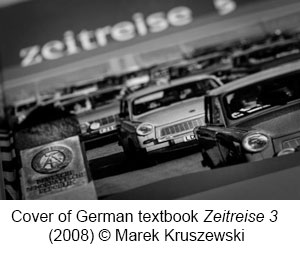Memory Practices: On What Counts as Worth Remembering in History Education (Felicitas Macgilchrist)

A central goal of history education is, according to one of the federal curricula in Germany, to “enable students to participate in their community’s cultural memory.” But what does it mean to participate in your community’s cultural memory? And what role do textbooks and other educational media play in this process? This explicit foregrounding of cultural memory led me and other colleagues at the Georg Eckert Institute to think about history education in terms of what we’ve been calling “memory practices.”
What I particularly like about the concept of memory practices is that it emphasises that history is something we actively do. It isn’t something that is lying around waiting to be found; it is something we have to actively construct together with other people, books, digital media and material things.
I also like that the concept picks up on the politics of education: teaching and learning about history is always going to involve selection and reduction. So, the question which interests me is how people make those selections, and what they include and exclude. Thinking about history education in terms of memory practices means, for me, taking up Herbert Spencer’s classic curriculum question (What knowledge is of most worth?) and using it to turn a critical gaze on what – or whose – knowledge about the past is offered to students as most worthwhile to engage with and remember. Perhaps I should note that I mean “remember” here in the creative sense of making the past present (“Do you remember when we went to …?”), rather than in the sense of memorising facts.
One large-scale project I am privileged to lead in this field is the research group “Memory Practices: Enacting and Contesting the Curriculum in Contemporary Classrooms.” In the first phase, I did ethnographic fieldwork with publishing houses in Germany, following teams of authors and editors as they produced textbooks. I was especially interested in conflicts over what counts as worth remembering. Authors writing about the revolution of 1918/19 were concerned, for instance, that they were writing the history of the victors. These findings are discussed in an article I co-authored with Ellen van Praet, “Writing the History of the Victors? Discourse, Social Change and (Radical) Democracy” (Journal of Language and Politics, 2013, 12, no. 4 (2013): 626-51). Other authors contested dominant accounts of Africa as a primitive continent by describing how globalised and developed some African city states were in the Middle Ages, as I present in the chapter, “Media Discourse and De/Coloniality.” (In Contemporary Studies in Critical Discourse Analysis, edited by Christopher Hart and Piotr Cap, 387-407. London: Bloomsbury.)
 In the second phase, I and colleagues Johanna Ahlrichs, Patrick Mielke and Roman Richtera are currently investigating what teachers and students actually do with textbooks, worksheets and other media (internet, films, etc.) in classrooms. We are conducting interviews, ethnographic fieldwork in schools and a quantitative survey to explore the following questions: How do teachers select which media to use in class? How do students engage with these media and with their associated cultural memories? Finally, how do educational policy-makers and curriculum designers understand cultural memory?
In the second phase, I and colleagues Johanna Ahlrichs, Patrick Mielke and Roman Richtera are currently investigating what teachers and students actually do with textbooks, worksheets and other media (internet, films, etc.) in classrooms. We are conducting interviews, ethnographic fieldwork in schools and a quantitative survey to explore the following questions: How do teachers select which media to use in class? How do students engage with these media and with their associated cultural memories? Finally, how do educational policy-makers and curriculum designers understand cultural memory?
What we are finding is that, to paraphrase media scholar Bernard C. Cohen, media may not be successful much of the time in telling students what to think, but they are stunningly successful at telling them what to think about. One central narrative which students are offered is the progress narrative, where different cultures/regions are located on a linear scale progressing toward a better life, with the global North pretty near the top.
What I find fascinating about the students in our study is that they can make very ironic comments on what they are supposed to find most worth remembering. When asked what he thought he should keep in mind about the German Empire, one student responded with a big grin: “That Germany has always been the best country ever!” Interestingly enough, when we analyse the educational media to which he has been exposed, although none of them say so explicitly, this is precisely their implicit message. This student is a good critical discourse analyst. He also seems to know how to act as a good student and do what is expected of him in class: which is to be slightly critical of historical narratives but not too radically critical of how these narratives shape today’s hegemonic discourse (in this example, technological and social progress).
At the moment we are working through our data and observations, and also developing a follow-up project which takes a global look at memory practices in history education.
- Se connecter ou créer un compte pour soumettre des commentaires
- Français

